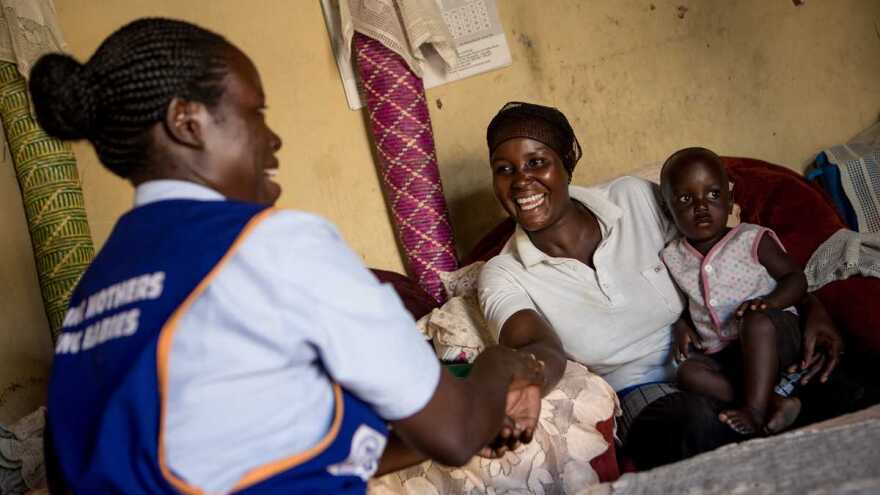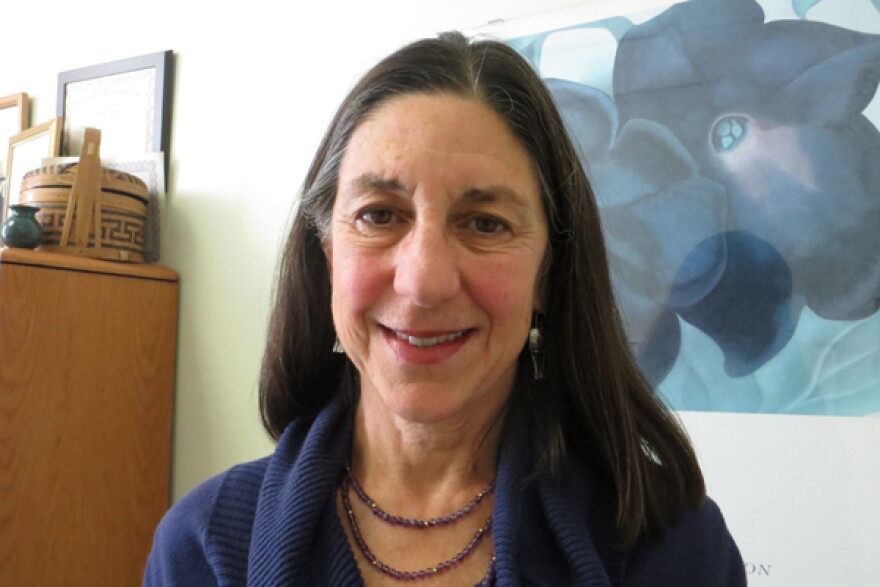Once a new mom with HIV delivers a healthy baby, sometimes she thinks she's 'done.'
The healthcare system has gotten very good at getting pregnant women who are HIV positive into treatment and preventing them from passing the infection on to their babies. Healthcare providers say what comes next is the problem: too many postpartum women are dropping out of care.
This story was originally published by WHYY's The Pulse.
"She gets lots of attention; she gets lots of strokes for coming in, and that kind of starts to fall off after pregnancy," said Erika Aaron, director of Women's Services for the Partnership Comprehensive Care Practice at Drexel University College of Medicine in Philadelphia and a nurse practitioner who has been caring for women with HIV for 25 years.
One of Aaron's patients, who didn't want her name used for this story, first discovered she had the AIDS virus when she was 25 and expecting her third child. Now in her 30s, she's pregnant with her fourth child. With medicine, the virus in her blood is now undetectable, and because of that, she and her healthcare team at Drexel is confident that she'll be delivering a healthy baby in just a few weeks.
In Philadelphia, about 90 percent of women who are pregnant and have the human immunodeficiency virus get some kind of HIV care. For a woman who's in treatment, the chances of passing the infection on to her baby is less than one percent.
A Missed Opportunity
Florence Momplaisir, an infectious-disease physician at Drexel, says a pregnant woman will do lots of things to protect her baby. Expectant moms swear off cigarettes and alcohol. They even give up foods they love. Pregnant women with HIV are also often very good about following their doctor's orders and sticking with their medication, Momplaisir said.
But three months after delivery, just 38 percent of new HIV-positive moms in Philadelphia are still connected to care, according to an analysis from researchers at Drexel and the Philadelphia Department of Health.
"They fall out of care because they are so afraid someone is going to find out," Aaron said.
In her practice, Aaron says, young women especially can be very sensitive about making sure that no one knows their HIV status, fearing rejection from a partner or family.
Stigma makes HIV different from managing other chronic illnesses.
Countering Stigma
"The stigma that we are best able to address is how people feel about themselves," said obstetrician-gynecologist Mitchell Besser.

He developed a program in Cape Town, South Africa called Mothers2Mothers, which hires women with HIV as mentors to support new moms. In Cape Town, when a woman is ready to share her HIV status, a mentor can go to the family home with the patient, and Besser says that support can be transformative.
There are now hundreds of Mothers2Mothers program sites in seven African countries. Besser was in Pennsylvania recently to talk about ways to duplicate parts of the program there.
Besser says when the complications and stresses in someone's life begin to get better, that's when HIV treatment moves up as a priority.
"That's true in both Africa and here in Philadelphia. The geography is of course very different but many of the issues that people face are very similar," Besser said.
Competing Life Priorities

Drexel physician Florence Momplaisir was doing her specialty training when she says she realized her medical expertise wasn't nearly enough to help a mother who is struggling with addiction or who doesn't have a place to live.
"It's not a theoretical phenomenon," Momplaisir said. "Women are really falling (out of care) and dying."
Momplaisir remembers one mom with HIV who came in for a check-up about two weeks after giving birth. The doctor started the usual workup to figure out the best anti-retroviral medicines for the woman, but the patient said what she needed most was to be back on her anti-anxiety medication. The medical practice where Momplaisir worked at that time only managed HIV.
"She was really upset at the fact that she had to go to one clinic for her primary care, one clinic for her mental health and one clinic for her HIV care," Momplaisir said.
The woman stopped coming in. When Momplaisir finally reached the woman's sister, she learned her patient had died.
It's not clear what happened. Besides having untreated HIV and mental health troubles, the patient had been enduring domestic violence. She was also an intravenous drug user. But those are the kinds of life complications that Momplaisir says the care system has to get better at dealing with.
Sara Cifuentes leads a team of social workers and case managers at the West Philadelphia office of ActionAIDS, Inc. that provides non-medical support for people with HIV. Eighty percent of agency clients have housing trouble.
"So getting to a medical appointment drops down the list," Cifuentes said.
Going Stealth
Marie Spencer works for the Dorothy Mann Center at Philadelphia's St. Christopher's Hospital for Children. She's an outreach worker who's a detective, of sorts, trying to track down women who've dropped out of care.
"We live in the neighborhood, we are where our clients are," Spencer said. "If I see a person, and I know they have children around my grandchild's age, I'll go get my grandchild, then we'll go to that park, or walk past their house."
First, Spencer gives patients what they need. She has transit tokens for the bus. She'll bring formula for a newborn. She offers lunch and friendly hellos.
Then Spencer begins to talk about how important it is to keep up treatment. She's good at her job, she says, because she's not a doctor and because she's discreet.
Sometimes she goes undercover as an aunt or a neighbor — once she pretended to be an old classmate of someone's mom.
One-Stop Healthcare
To help people stick with treatment for life, Drexel and the Dorothy Mann Center designed health care sites that provide more comprehensive care.
At Drexel, "The woman sees the obstetrician or a midwife, they'll see the social worker that works in the HIV clinic, they'll see myself, a nurse practitioner to take care of their HIV. They'll see a psychologist, they'll see a nutritionist," Erika Aaron said.
One Mann Center patient, we're calling her "Katrina" to protect her privacy, found out she was HIV positive about a month before her due date. She was devastated at first.
Katrina remembers hormones raging and being sleep deprived in the first weeks after her son was born. In those early days, every time she had to go to a doctor's appointment, it was a reality check.
"This is really you, this is really happening. The red ribbons are in your face," Katrina said. "It was such a struggle just to come to the doctor mentally."
It was a relief to book one day of appointments for both herself and her son, Katrina said.
"Almost like Super Walmart, one-stop shop," she said.
And it's keeping mothers in treatment.
At the two-one stop HIV clinics in Philadelphia, about 72 percent of postpartum patients were connected to care three months after delivery, nearly twice the citywide average.





